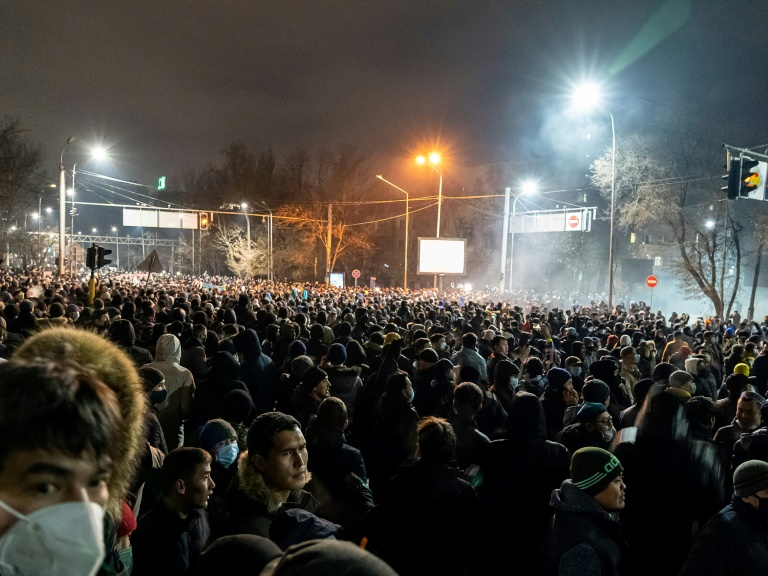Kazakhstan’s president imposed states of emergency in the largest city Almaty and an oil-rich western region Wednesday after unprecedented protests that began over a regional energy price hike engulfed other parts of the vast ex-Soviet country.
The southeastern city of Almaty, Kazakhstan’s financial capital, was in chaos from late on Tuesday as police fired tear gas and stun grenades to quell unrest that began in the west of the country over a spike in local prices for Liquified Petroleum Gas (LPG).
President Kassym-Jomart Tokayev signed orders on states of emergency in Almaty and the hydrocarbon-rich western region of Mangystau effective from January 5 until January 19, the presidential website reported.
A curfew will be in place in both territories from 23:00 to 7:00.
Tokayev had hours earlier called for a return to order in a video posted on Facebook by his press secretary Berik Uali.
“Don’t submit to provocations from within and without.
Do not heed calls to assault government buildings. This is a crime for which you will be punished. The government will not be felled, but we don’t need conflict,” Tokayev said in the address.
An AFP journalist in Almaty witnessed police firing stun grenades and tear gas into a crowd of over five thousand people that grew in size as protesters marched through central streets shouting anti-government slogans and sometimes attacking vehicles.
The protesters yelled “old man out” — a reference to Tokayev’s still-powerful predecessor and mentor Nursultan Nazarbayev — and “government resign” before police moved in, sparking battles with protesters in and around a city square.
Messenger apps Telegram, Signal and WhatsApp were all unavailable in the Central Asian country on Wednesday, while two independent media websites that reported on the protests appeared to have been blocked.
Smaller protests had been staged in cities across the republic of 19 million people from Sunday, beginning with the town of Zhanaozen in Mangystau.
– LPG price rise outrage –
The initial cause of the unrest was a spike in prices for LPG in hydrocarbon-rich Mangystau, but a government move to lower the prices in line with the protesters’ demands failed to calm them.
President Kassym-Jomart Tokayev tweeted late on Tuesday that authorities had taken a decision to lower LPG prices in Mangystau “in order to ensure stability in the country.”
Reports by independent media suggest that his announcement of a new price of 50 tenge (11 US cents) per litre down from 120 at the beginning of the year had failed to weaken the protests in Zhanaozen and Mangystau’s capital Aktau.
Footage from Aktau shared on social media Tuesday evening showed thousands of protesters who had camped in the city centre overnight encircled by police.
Arrests of activists and small spontaneous marches were reported in the national capital, Nur-Sultan, which is named in honour of founding leader Nazarbayev.
Mangystau depends on comparatively cheap LPG as the main fuel for automobiles and any jump in prices would have affected the price of food, which has seen steep increases since the beginning of the coronavirus pandemic.
Zhanaozen was the scene of the deadliest unrest since the republic gained independence in 1991, when at least 14 striking oil workers were killed in 2011 as police crushed a protest over pay and working conditions.
Tokayev took office in 2019, handpicked as a successor by Nazarbayev, a close ally of Russian president Vladimir Putin.
But Nazarbayev, who is 81 and had ruled Kazakhstan since 1989, retains control over the country as chairman of the security council and “Leader of the Nation” — a constitutional role that affords him unique policymaking privileges as well as immunity from prosecution.
Spontaneous, unsanctioned protests are illegal in Kazakhstan despite a law that passed last year easing some restrictions of freedom of assembly in the authoritarian state.











